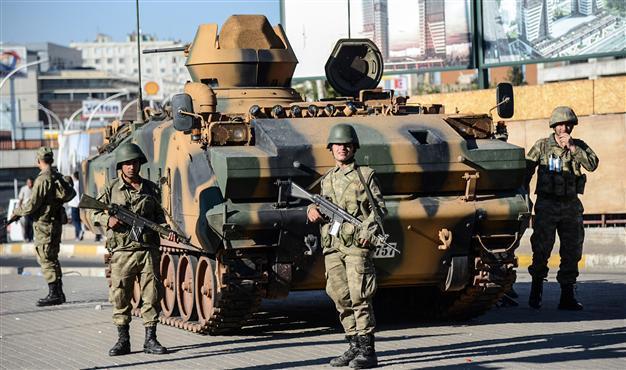Curfew extended in Diyarbakır province after deadly anti-ISIL protests
DİYARBAKIR

Turkish soldiers stand guard by a tank in downtown Diyarbakir on Oct. 8. The army has been deployed in the streets of Diyarbakir to impose a curfew, following violent protests. AFP PHoto / İlyas Akengin
The curfew declared in the southeastern province of Diyarbakır has been extended until Oct. 9, after at least 21 people died during protests condemning the Islamic State of Iraq and the Levant (ISIL) militants’ assault on the Syrian Kurdish town of Kobane.The province, which became the hotspot of the nationwide anti-ISIL protests on Oct. 7, has witnessed tense clashes between Kurdish demonstrators condemning the Turkish government and suspected members of the Free Cause Party (Hüda-Par), the political wing of the radical Turkey-based Islamist Hizbullah group.
Gendarmerie forces have taken tight security measures in the city’s streets, in a rare move since the lift of the province’s state of emergency in 2002.
Diyarbakır Chief of Police Halit Böğürcü said five of the victims were Hüda-Par members while the other three victims were yet to be identified.
Local reports have accused alleged members of Hizbullah of opening fire on protesters in Diyarbakır’s central Sur district and Bağlar suburb, killing at least two people and injuring more than 10. The crowd subsequently attacked an association building belonging to Hüda-Par, according to reports.
Schools in the province have been closed for Oct. 8, while courses at Dicle University, which has been the center of frequent clashes between Kurdish and pro-Hizbullah student groups, were postponed until next week. Flights to the province have also been canceled due to the curfew.
Diyarbakır has become one of the strongholds of the Hüda-Par, which rose to become the third largest party in the province during the March local elections. Many Kurdish activists condemn the party for its affiliation with Hizbullah, which is said to have aided the state in the torture and killing of Kurdish activists and members of the outlawed Kurdistan Workers’ Party (PKK) in the 1990s.
















